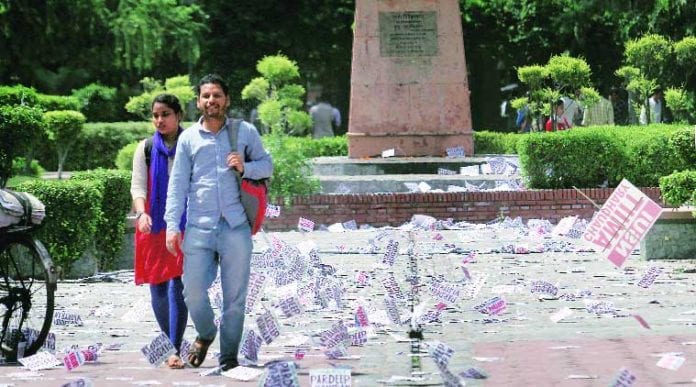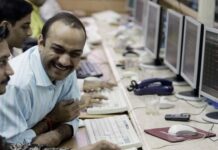Delhi University goes to polls on 12 September and despite a Supreme Court order banning posters on the public property, thousands of white posters each carrying just the name and the party of a certain candidate contesting the election have mushroomed in the capital.
They are on flyovers, billboards, along with the length of dividers, on dustbins and pinned to street lights. One can even spot disingenuous attempts at registering the identity of the contestants in the minds of not just the little over 17,000 voters at DU but everybody else in the national capital.
As one drives closer to the Delhi University areas in its two campuses, the spread of posters thickens. It’s easy to notice spelling mistakes in the names printed on these posters — Akhil Bharatiya Vidyarthi Parishad’s Sudhir Dedham’s name is spelled as Sudhir Dedha and Ankiv Basoya is Ankiv Basoya; National Students’ Union of India’s Ankit Singh is Ankit Singh and Indian National Students Organisation’s Hemant Kumar is Hemant Kumar. These spelling mistakes, however, may have been done knowingly to to dodge the 5 May 2018 Supreme Court order which made defacement of public property a punishable offence.
The Supreme Court passed the in a writ petition filed by advocate Prashant Manchanda against defacement of public property including property of Delhi University, college campuses, Delhi Metro Rail Corporation, municipal properties, flyovers, boundary walls of public buildings and public streets.
The order was a culmination of existing acts on defacement of public property. It considered the Metro Rail (Operations and Maintenance) Act 2002, a Central enactment which empowers police officers to register cases and take action against offenders who are likely to cause damage to metro properties. The order also considered the Prevention of Damage to Public Property Act, 1984, which prescribes imprisonment for a term which may extend to five years and with fine to whoever commits mischief by doing any act in respect to public property.
Another act that the apex court reiterated in the order was The Delhi Prevention of Defacement of Property Act, 2007, the Section 3 of which prescribes punishment with imprisonment for a period that may extend to one year to whoever defaces property in public view by writing or marking with ink, chalk, paint of any other material except for the purpose of indicating the name and address of owner or occupier of such property.
The order lays down that the university and the colleges will have committees to ensure that the court’s orders are followed and recommends sensitization workshops to be conducted by the management to spread awareness about the relevant provisions and statues.
During every election, the Delhi University VC appoints a Chief Election Officer and a team at each college to ensure a smooth conduct of elections. This election season, professor Ravi Ranjan is acting as the returning officer at Zakir Hussain College. Ranjan pointed that unlike JNU which is a closed campus, Delhi University colleges spill out of its North and South campuses, like Deen Dayal Upadhyaya College in South West Delhi, Shaheed Sukhdev College of Applied Science for Women in East Delhi, Bhim Rao Ambedkar College in East Delhi, Ramanujan College in South Delhi, Janki Devi Memorial College in West Delhi.
“Our college is an off-campus college. There’s a quantum of punishment in place and the Delhi Police has set up 20 control rooms. But we can only monitor what’s going on inside our respective colleges,” said Ranjan, adding that the Delhi University Code of Conduct prescribes that each student be accompanied only by four ‘bonafide students’ is flouted because who can stop herds of party workers and other political enthusiasts from parading along?
One way to do this is by taking punitive action against the erring students and inserting lessons into public memory, but that requires strong will on the part of the police administration.
Kawalpreet Kaur, leader of All India Students Association (AISA) that has struck an alliance with AAP’s Chhatra Yuva Sangharsh Samiti feels that the entry of outsiders in the campus and cars should be banned inside the campus during election season. She also feels that presidential debates should be made mandatory in order to encourage intelligent debates and cut out the extravagant drama that is irrelevant to the welfare of students.
N Sukumar, professor of Political Science at Faculty of Social Sciences, along with Ranjan, had done a survey on social inclusion in student union politics in eight different government universities nearly 10 years ago. Sukumar says that the Lyngdoh Commission Guidelines (a report that exceeds the initial mandate of prescribed by the Supreme Court of India and prescribes norms for conducting elections) provided space for independent and other politically active groups a chance to participate.
“When these guidelines were first implemented in 2007, they were followed for some years. All that has been put into the dustbin now and universities follow their own norms about how elections will be conducted,” Sukumar said stating that parties should raise issues like lack of fellowships instead of stressing only on caste and gender discrimination.
When the Lyngdoh Guidelines were introduced, both the BJP and the Congress were critical of it for non-involvement of political parties in campus elections, claiming that parties are a source of inspiration for student leaders. Student Federation of India, aligned to the Communist Party of India, was also skeptical over the proposal of indirect elections that, in their view, could feed the private interests of the management.
The Lyngdoh Guidelines state that ‘all institutions must, over a period of five years (since it was issued), convert from the nomination model to a structured election model, that may be based on a system of parliamentary (indirect) elections, or on the presidential (direct) system, or a hybrid of both’.
Eminent sociologist TK Ommenn in his chapter Student Politics in India: The Case of Delhi University (1974) was critical of the system of indirect elections to DUSU because it limits the interplay of democratic forces and paves the way for corruption of various kinds as money is the basic resource needed by aspiring student leaders, as a result, students from well off families tend to monopolise leadership positions.
“Help in terms of men and material is the motivational force and not ideological compulsions,” he had said. And that’s what seems to be happening in present-day politics in Delhi University. Mukul Gupta, a senior Supreme Court advocate, said universities travel beyond Lyngdoh in letter and spirit and make their own guidelines.
“The Lyngdoh Guidelines prescribe that a person tried and convicted should be barred. The trial starts from the date the charges are framed but university officials try to use this as a weapon against any of the candidates selectively,” he pointed out, adding that there are two grey areas where the action is arbitrary. One is that as per the Lyngdoh Guidelines, hearing is supposed to be provided to the person concerned but all this drama culminates in four days of filing nominations and scrutiny of applications. You can’t expect students to run around the courts during that period.
Second, the election committee and a grievance committee are supposed to work in tandem but none of them, according to Gupta, are willing to give the candidate in question a chance to be heard. It is a fundamental law that any action of any authority that has civil consequences will hear out the person in question.
Advocate Nikhil Bhalla highlighted the clause on disciplinary action in the Lyngdoh Commission guidelines. “There is a clear contradiction between the Lyngdoh guidelines and the statutes of the Delhi University. The said guidelines seek to prohibit a person from contesting elections merely on the ground of an initiation of disciplinary inquiry against him, even if he is exonerated or charges are withdrawn,” he says. Furthermore, Bhalla added that colleges have not framed clear disciplinary procedures and punishments, thus a person can be disqualified if he had an inquiry merely for smoking on campus or defaulting a hostel or mess bill.
These legal complications came to the fore in the case of Rocky Tuseed. NSUI’s presidential candidate (2017-2018), Tuseed was first de-barred from contesting elections and it was only after legal intervention from senior counsel and member of the Congress party Salman Khurshid that his candidature was restored.
Tuseed had filed his nomination for the post of the DUSU President on 4 September last year. However, an inquiry was initiated against him on 5 September on the basis of an email received by the DUSU Election Commission alleging that disciplinary action had been initiated against him in Shivaji College, where he had studied. While Rocky had contended that he wasn’t given an opportunity of being heard, Delhi University relied on Lyngdoh guidelines that candidates shouldn’t be subject to any disciplinary action by university authorities.
In July 2018, shortly before the end of his tenure as president of the Delhi University Students’ Union, the Supreme Court upheld that “the court cannot lose sight of the fact that the Supreme Court has accepted the recommendations of the Lyngdoh Committee, which clearly stipulates
if a candidate had a disciplinary action, the same would be a non-eligibility for such a student to stand in elections”.
Tuseed, who has made several appearances in court during his tenure told Firstpost that the multiplicities in the laws are used as an excuse to take politically motivated action against students and this could happen to a student from any party. He asserted that the need to address the irregularities between the DUSU Constitution and the Lyngdoh guidelines. For instance, the DUSU Constitution framed in 2005 state that the election of the office-bearer should be completed at the latest by the 16th of August each year, after which the DUSU office is sealed.
“It’s 2018 and the elections are taking place in September but the office is sealed as per the old body of laws,” he said that dated guidelines, for instance, the one that prescribes an expenditure of Rs 5000 per candidate, also need revision.
Tuseed also suggested that the DUSU office mustn’t exist only during election season because bitter political enmities between parties lead to a disruption of governance and there have to be stricter laws to ensure parties and student bodies work with each other and not against each other. He further revealed that because of his legal battles, the party’s work has been affected. The most recent being the cancellation of the Shankar Lal Concert Hall on 28 July that was booked for an event on cultural harmony.
Some laws are outdated and others are inconsistent with newer laws. At Delhi University, there are laws regulating the conduct of elections and beyond. But if student politics is losing its ethos in cracker smoke, lying scattered on streets in the form of pieces of paper, and in garlands and drumrolls that mimic the optics of mainstream politics, then the university needs legal reform, such that student bodies don’t need to depend on political parties for either funding or legal intervention.
~ Preksha Mishra
Reported by First Post













